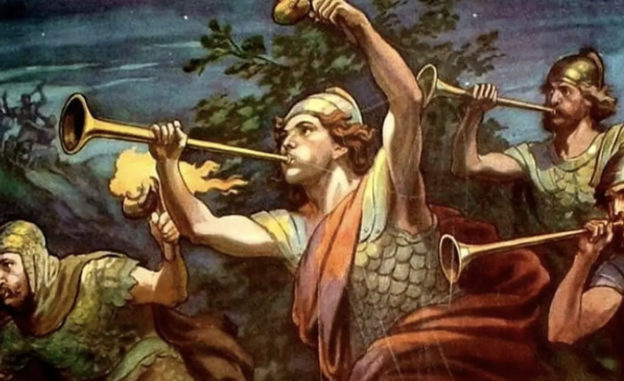Why do people seek status and security? Usually, because it places you in a position of strength. With status, you can influence others for your own benefit or to avoid discomfort. With security, you can rest knowing that others view you as strong or solidly on-side, so why bother attacking?
The problem with these positions is that the desire for status and security outside of God undermines God’s People as a whole. It makes them weaker. In Judges, the desire of Ephraim for status and the desire of two Israelite towns for security weakened Israel’s overthrow of Midianite oppression. For the two Israelite towns, their desire for security ended in disaster. It is the same for God’s People today.
When the Midianite army turned into the Midianite rabble and fled under God’s attack, Gideon called out the Ephraimites to seize the crossing points at the River Jordan and capture the fleeing Midianites (vv.24-5).
While God’s victory through the 300 Israelite men conclusively showed it was God that turns weakness to strength, the Ephraimites were concerned about their image. Concerned for their status as the premier tribe of the North (or somesuch), they angrily asked Gideon who he thought he was fighting the Midianites without calling on them to assist (v.1).
Gideon stroked their pride to avoid bloodshed, by suggesting that just as the vintage of Ephraim was better than his own clan’s drop, so too their victory in capturing Oreb and Zeeb was better than anything Gideon and his band had done, standing in the dark with trumpets and torches shouting at the Midianites (vv.2-3). Ephraim’s status acknowledged, their anger cooled.
Sadly, status was not the only problem to weaken the effectiveness of God’s People. Security also played its part. After chasing the Midianites for miles, Gideon and his small band were understandably tired yet still committed to capturing two more Midianite leaders (vv.4-5). They asked the town of Succoth for provisions, to which Succoth’s leaders replied “are the hands of Zebah and Zalmunna already in your hand?” (v.6) In other words, no.
Gideon promised to punish Succoth for failing to give provisions (v.7). Likewise, Penuel answered the same to Gideon’s reasonable request, inviting the same response (vv.8-9).
In one sense this reluctance is understandable. If Gideon and his men failed, the angry Midianites might return and launch reprisals on Succoth and Penuel for helping the enemy. Their leaders chose security over helping God’s People achieve victory over their oppressors. They could not see God’s hand moving in events, and chose the conservative approach.
Succoth and Penuel chose the wrong side. Gideon fell on the remaining 15,000 men of Midian (after 120,000 had already been dealt to), killing them and capturing Zebah and Zalmunna (vv.10-12).
After this, Gideon went to Succoth to make things square (v.13). After capturing a young man and getting a list of the names of Succoth’s leaders, he taunted Succoth with their own words from earlier, then as promised seized the elders and whipped them with thorns and briers to teach “the men of Succoth a lesson” (vv.14-16). The tower of Penuel was likewise broken down, as promised (v.17).
Since they joined Israel’s enemies by their “neutrality”, they were treated as Israel’s enemies. They joined Zebah and Zalmunna in feeling Gideon’s retribution (vv.18-21), in both cases likely driven by some element of revenge at personal hurt felt.
It seems that Zebah and Zalmunna captured and killed Gideon’s brothers, perhaps in revenge, and so Gideon attempted to humiliate them by having a youngster kill these mighty kings. Likewise, the whipping of elders with thorns and briars sounds all too personal in its delivery.
Besides not whipping our church’s elders, what does this passage teach us? In both instances, Israel was weakened and came into some form of internal conflict because of desires for status and security. Both are found in excessive interest in the self rather than the whole.
There is no place for status in the Church. However gifted anyone is, those gifts are from God. They do not make one more important than any other. Many problems stem from seeking, or being given, too much status. Celebrity pastors or power grabbing church members only weaken the Church by demeaning the contribution of others.
Likewise, seeking status for the Church externally could breed compromise with the world, and affect the Church’s witness.
The same goes for security. Looking to avoid trouble with the world is sensible to a point, but not when it conflicts with what God is doing. When we seek security through compromise or neutrality instead of taking a stand for the Truth revealed in God’s Word, we weaken the Church, its witness, and its unity.
Instead of seeking status or security, we ought to be like Christ who laid aside both. Christ humbled himself for our sake, even dying on the Cross for our sins. He was raised to life so we too might be raised. It is in Christ that we find our true status, security, and strength.

